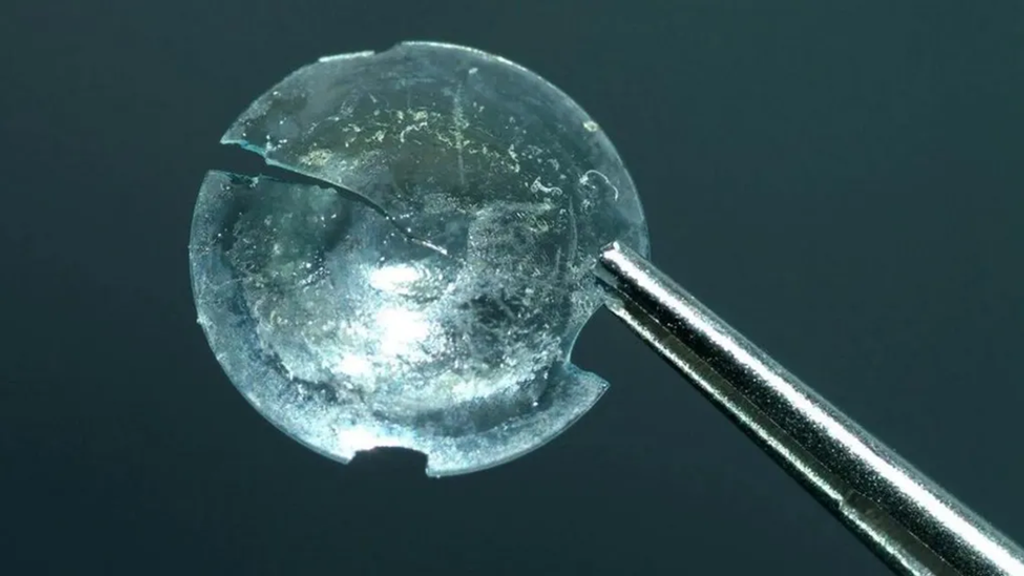Some stories stand out in the realm of medical anomalies for their sheer peculiarity. One such case, documented in the BMJ Case Reports on August 10, 2018, involved a woman who unknowingly harbored a contact lens in her eyelid for nearly three decades. This tale, which begins with a seemingly trivial injury, underscores the remarkable resilience of the human body and the importance of detailed patient histories.
The “Lost” Contact Lens Incident
Nearly thirty years ago, a 14-year-old girl in the United Kingdom was hit in the eye by a shuttlecock during a game of badminton. In the aftermath, she lost her hard contact lens—a small inconvenience that didn’t warrant much concern. Despite a thorough search, the lens was never found. The incident faded into the background, and she stopped wearing hard contact lenses, moving on with her life.
The Unfolding Mystery
Fast-forward 28 years. At the age of 42, the woman visited an ophthalmologist with complaints of a swollen and drooping left eyelid, an issue she had been experiencing for about six months. Palpation of the eyelid revealed a small, firm lump under the skin. To investigate further, an MRI was conducted, which showed a “well-defined” cyst measuring eight by four by 6 millimeters located just above her left eye.
Surgical Revelation

The contact lens was found lodged inside a cyst that was removed from the woman’s eyelid (Picture Credit: BMJ Case Reports)
Deciding on surgical removal of the cyst, the doctors prepared for a routine procedure. However, during the surgery, the cyst ruptured, revealing an unexpected find—a fragile, hardened contact lens. This discovery left the medical team and the patient puzzled. Initially, the woman did not recall how the lens could have ended there. Only when her mother recounted the badminton incident from her teenage years did the puzzle pieces begin to fit together.
Medical Insights
The doctors involved in the case hypothesized that the contact lens had migrated into the patient’s left upper eyelid at the time of the trauma. It remained there, undetected, for 28 years. This hypothesis, while plausible, raises questions about the body’s ability to encapsulate foreign objects and remain asymptomatic for such an extended period.
One of the more intriguing aspects of this case is why the contact lens only caused symptoms after nearly three decades. The report notes that no apparent triggers could have led to the sudden onset of swelling and inflammation. The woman did mention that her left eyelid had been droopy for many years, though it had not been bothersome enough to seek medical attention earlier. This longstanding ptosis was likely due to the embedded contact lens.
Clinical Takeaways
This case highlights several key points for medical practitioners:
- Detailed Patient Histories: Always delve deep into a patient’s history. Even seemingly minor past incidents can have long-term implications.
- Foreign Body Encapsulation: The human body can encapsulate foreign objects for extended periods without causing significant symptoms. This capability can delay diagnosis and treatment.
- Diagnostic Imaging: MRI and other imaging techniques are crucial in identifying and locating foreign objects within the body, guiding surgical intervention.
- Unexpected Findings: Be prepared for surprises during surgical procedures. The unexpected discovery of the contact lens underscores the importance of maintaining a flexible and adaptive approach during surgery.
Conclusion
The case of the embedded contact lens is a remarkable example of the unforeseen surprises that can arise in medical practice. It reminds practitioners of the complexity of the human body and the need for comprehensive patient evaluations. While this woman’s experience is rare, it underscores the importance of considering all possibilities, no matter how remote they may seem, in pursuing accurate diagnosis and effective treatment.
Disclaimer Statement: This information is from a third-party health news channel. The opinions expressed here belong to the respective authors/entities and do not reflect the views of Docquity. Docquity does not assure, endorse, or vouch for any of the content and bears no responsibility for it in any way. It is essential to take all necessary steps to ensure the information and content provided are accurate, current, and verified. Docquity disclaims any express or implied warranties related to the report and its contents.
References
Woman’s lost contact lens found in her eyelid – 28 years later [Internet]. Accessed on July 08, 2024. Available from: https://www.cbsnews.com/news/womans-lost-contact-lens-found-in-her-eyelid-28-years-later/
About Docquity
If you need more confidence and insights to boost careers in healthcare, expanding the network to other healthcare professionals to practice peer-to-peer learning might be the answer. One way to do it is by joining a social platform for healthcare professionals, such as Docquity.
Docquity is an AI-based state-of-the-art private & secure continual learning network of verified doctors, bringing you real-time knowledge from thousands of doctors worldwide. Today, Docquity has over 400,000 doctors spread across six countries in Asia. Meet experts and trusted peers across Asia where you can safely discuss clinical cases, get up-to-date insights from webinars and research journals, and earn CME/CPD credits through certified courses from Docquity Academy. All with the ease of a mobile app available on Android & iOS platforms!







